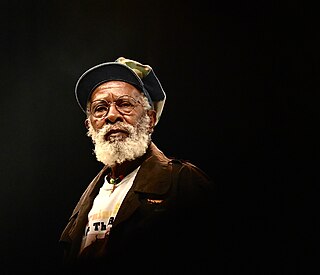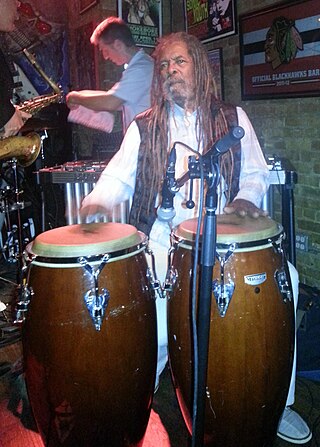
Reggae is a music genre that originated in Jamaica in the late 1960s. The term also denotes the modern popular music of Jamaica and its diaspora. A 1968 single by Toots and the Maytals, "Do the Reggay", was the first popular song to use the word reggae, effectively naming the genre and introducing it to a global audience. While sometimes used in a broad sense to refer to most types of popular Jamaican dance music, the term reggae more properly denotes a particular music style that was strongly influenced by traditional mento as well as by American jazz and rhythm and blues, and evolved out of the earlier genres ska and rocksteady. Reggae usually relates news, social gossip, and political commentary. It is instantly recognizable from the counterpoint between the bass and drum downbeat and the offbeat rhythm section. The immediate origins of reggae were in ska and rocksteady; from the latter, reggae took over the use of the bass as a percussion instrument.

Winston Rodney OD, better known by the stage name Burning Spear, is a Jamaican roots reggae singer-songwriter, vocalist, and musician. Burning Spear is a Rastafarian and one of the most influential and long-standing roots artists to emerge from the 1970s.
The music of Jamaica includes Jamaican folk music and many popular genres, such as mento, ska, rocksteady, reggae, dub music, dancehall, reggae fusion and related styles.
Dub is an electronic musical style that grew out of reggae in the late 1960s and early 1970s. It is commonly considered a subgenre of reggae, though it has developed to extend beyond that style. Generally, dub consists of remixes of existing recordings created by significantly manipulating the original, usually through the removal of vocal parts, emphasis of the rhythm section, the application of studio effects such as echo and reverb, and the occasional dubbing of vocal or instrumental snippets from the original version or other works.

Horace Andy is a Jamaican roots reggae songwriter and singer, known for his distinctive vocals and hit songs such as "Government Land", as well as "Angel", "Spying Glass", and "Five Man Army" with English trip hop group Massive Attack. He is also famous for a cover version of "Ain't No Sunshine". Andy is often described as one of the most respected and influential singers in Jamaica.

Linton Kwesi Johnson OD, also known as LKJ, is a Jamaica-born, British-based dub poet and activist. In 2002, he became the second living poet, and the only black one, to be published in the Penguin Modern Classics series. His performance poetry involves the recitation of his own verse in Jamaican patois over dub-reggae, usually written in collaboration with reggae producer/artist Dennis Bovell.

Dub poetry is a form of performance poetry of Jamaican origin, which evolved out of dub music in Kingston, Jamaica, in the 1970s, as well as in London, England, and Toronto, Canada, cities which have large populations of Caribbean immigrants. The term "Dub Poetry" was coined by Dub artist Linton Kwesi Johnson in 1976, and further popularized by artist Oku Onoura, which consists of spoken word over reggae rhythms, originally found on the backing or "version" side of a 12 or 7 inch vinyl record.
Steppin' Razor may refer to:

Jean "Binta" Breeze MBE was a Jamaican dub poet and storyteller, acknowledged as the first woman to write and perform dub poetry. She worked also as a theatre director, choreographer, actor, and teacher. She performed her work around the world, in the Caribbean, North America, Europe, South-East Asia, and Africa, and has been called "one of the most important, influential performance poets of recent years".

Inner Circle, also known as The Inner Circle Band or The Bad Boys of Reggae, are a Jamaican reggae band formed in Kingston in 1968. The band first backed The Chosen Few in the early 1970s before joining with successful solo artist Jacob Miller and releasing a string of records. This era of the band ended with Miller's death in a car crash in 1980.

Lillian Allen is a Canadian dub poet, reggae musician, writer and Juno Award winner.
Oku Nagba Ozala Onuora, known as the "father of Jamaican dub poetry" is a Jamaican dub poet and performer.

The Mighty Diamonds were a Jamaican harmony trio, recording roots reggae with a strong Rastafarian influence. The group was formed in 1969 and were best known for their 1976 debut album, Right Time, produced by Joseph Hoo Kim, and the 1979 release, Deeper Roots.
Allan Hope CD, better known as Mutabaruka, is a Jamaican Rastafari dub poet, musician, actor, educator, and talk-show host, who developed two of Jamaica's most popular radio programmes, The Cutting Edge and Steppin' Razor. His name comes from the Rwandan language and translates as "one who is always victorious". His themes include politics, culture, Black liberation, social oppression, discrimination, poverty, racism, sexism, and religion.

Earl "Chinna" Smith, a.k.a. Earl Flute and Melchezidek the High Priest, is a Jamaican guitarist active since the late 1960s. He is most well known for his work with the Soul Syndicate band and as guitarist for Bob Marley & the Wailers, among others, and has recorded with many reggae artists, appearing on more than 500 albums.
Yasus Afari is a Jamaican dub poet.

Errol Holt, also known as Errol Carter and by his nickname Flabba, is a Jamaican bass guitar player and a singer who was a member of The Morwells and the Roots Radics and has played on hundreds of Jamaican albums.

Larry McDonald is a Jamaican percussionist. He was born in Port Maria, Jamaica in 1937. McDonald played congas with Carlos Malcolm's band, Toots and the Maytals and the Count Ossie Band. He plays a wide variety of traditional percussion instruments.

On the Rock is an album by the Jamaican vocal trio Israel Vibration, released in 1995. It was nominated for a National Association of Independent Record Distributors Award. The trio promoted the album with a North American tour. "Sugar Me" and "Rudeboy Shufflin" were released as singles.
Cherry Natural is a Jamaican dub poet, author, motivational speaker and self-defense instructor. She has published three books of poetry and in received the Mutabaruka Award for Best Spoken Word Poet at the International Reggae & World Music Awards in 2019.













